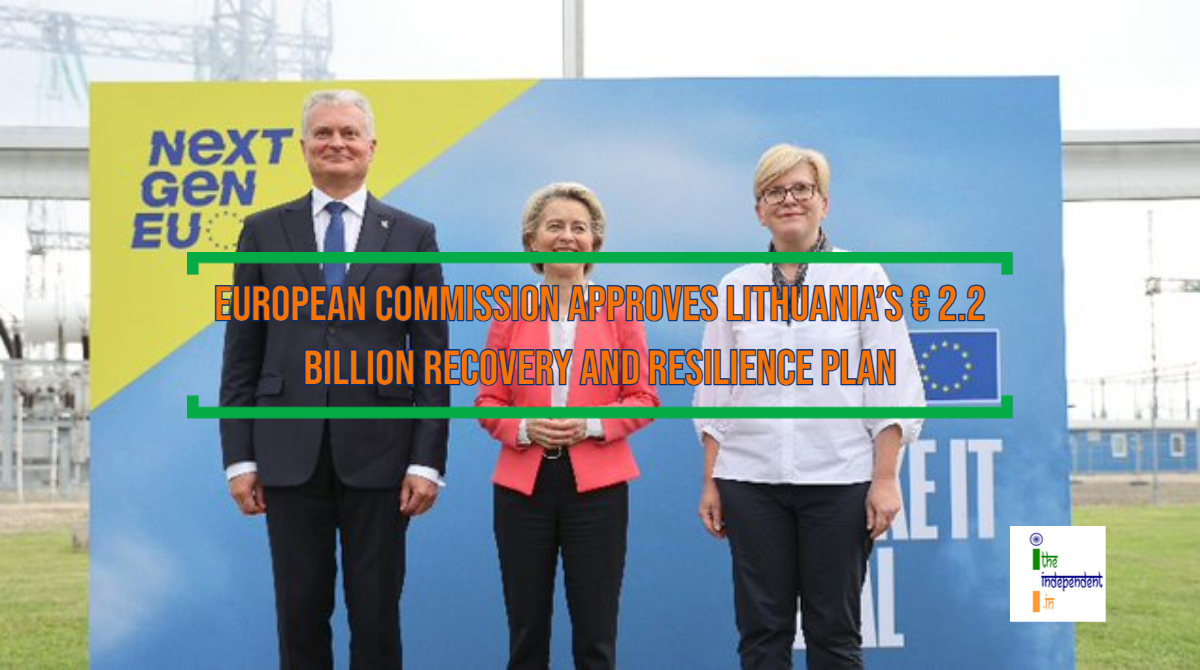
Lithuania’s plan includes reforms and investments to develop renewable energy power plants and create energy storage facilities
The European Union (E.U.) has approved the Recovery and Resilience Plan of Lithuania, paving way for funds in tune of € 2.2 billion for investments and reforms that will help Lithuania emerge stronger form the Coronavirus (COVID-19).
Lithuania stated in its plan submitted to E.U. to devote 38% of its total allocation to measures that support the achievement of climate objectives. This includes reforms and investments to develop renewable energy power plants and create public and private energy storage facilities.
It will invest € 242 million to develop offshore and onshore wind and solar power generation and create public and private energy storage facilities. It will spend € 341 million to replace the polluting road transport vehicles with environment friendly ones.
Another 32% would be used for supporting the digital transition. The plan includes considerable investments in connectivity, with a particular focus on the widespread deployment of high-speed networks and developing 2,000 km of high-speed connectivity infrastructure in rural and remote areas. It will also make investments in e-governance and develop AI solutions for the Lithuanian language.
Taking it to twitter, the President of European Commission – Ursula von der Leyen tweeted,
— Ursula von der Leyen (@vonderleyen) July 2, 2021
Green light to Lithuania's recovery plan!
It will help build a green and digital future.
With #NextGenerationEU investments, Lithuanian citizens will benefit from better healthcare, education, digital skills and social protection.
She further tweeted,
Ačiū @GitanasNauseda & @IngridaSimonyte.
— Ursula von der Leyen (@vonderleyen) July 2, 2021
Therecovery plan includes the right reforms and investments to make Lithuania stronger and more innovative.
Today was just the beginning. We will stand by you every step of the way to make #NextGenerationEU a success. pic.twitter.com/IFJ6ChVVSk
The European commission tweeted,
Paversk tai tikrove! Let’s #MakeItReal for Lithuania!
— European Commission
We have approved Lithuania’s €2.2 billion recovery and resilience plan.
This #NextGenEU financing will support investment and reform measures put forward by Lithuania to emerge stronger from the pandemic.(@EU_Commission) July 2, 2021
Lithuania hopes to improve the quality, accessibility and efficiency of the healthcare system, development of centres of expertise in infectious diseases and the digitalisation of the healthcare system. Besides, consolidation of the school network, modernisation of general education, improvement of vocational education and training, adult learning and improvement in the funding of higher education will also be on the cards. It will spend € 268 million to improve the healthcare infrastructure in Lithuania.
It further tweeted
Lithuania’s plan will accelerate reforms and investments in education and healthcare.
— European Commission
Key projects like strengthening social protection and building a more resilient health system will make a difference in people’s lives ↓ #NextGenEU pic.twitter.com/OgB8ftyW3u(@EU_Commission) July 2, 2021
It will also work to reform the guaranteed minimum income protection, scale-up the coverage of unemployment insurance scheme and revise benefits and improvement of the pension indexation mechanism. It will also increase the adequacy of the social safety net and reinforce social resilience.
The European Council would disburse € 289 million to Lithuania in pre-financing. This represents 13% of the total allocated amount for Lithuania.
The E.U. had announced a € 672.5 billion Recovery and Resilience Facility (RRF) in 2020 to help European economies cope-up with the fight the economic crisis caused by COVID-19). Of this, € 312.5 billion will be given as grants and € 360 billion in loans. All the 27 Member States are required to submit a recovery and resilience plan to get their share of funds.







